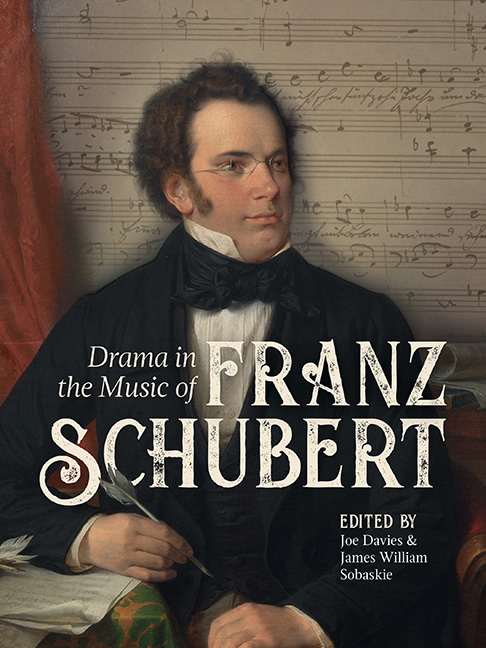Book contents
- Frontmatter
- Dedication
- Contents
- List of Figures
- List of Tables
- List of Contributors
- Acknowledgements
- Preface
- Introduction: Internal Dramas
- PART I STAGE AND SACRED WORKS
- 1 Opera that Vanished: Goethe, Schubert, and Claudine von Villa Bella
- 2 Pioneering German Musical Drama: Sung and Spoken Word in Schubert's Fierabras
- 3 The Dramatic Monologue of Schubert's Mass in Ab Major
- PART II LIEDER
- PART III INSTRUMENTAL MUSIC
- Select Bibliography
- Index
3 - The Dramatic Monologue of Schubert's Mass in Ab Major
from PART I - STAGE AND SACRED WORKS
Published online by Cambridge University Press: 25 March 2020
- Frontmatter
- Dedication
- Contents
- List of Figures
- List of Tables
- List of Contributors
- Acknowledgements
- Preface
- Introduction: Internal Dramas
- PART I STAGE AND SACRED WORKS
- 1 Opera that Vanished: Goethe, Schubert, and Claudine von Villa Bella
- 2 Pioneering German Musical Drama: Sung and Spoken Word in Schubert's Fierabras
- 3 The Dramatic Monologue of Schubert's Mass in Ab Major
- PART II LIEDER
- PART III INSTRUMENTAL MUSIC
- Select Bibliography
- Index
Summary
Introduction
Franz Schubert fussed over his fifth Mass. Starting the score in November 1819, he considered it complete three years later. A letter sent to Josef von Spaun on 7 December 1822 testifies: ‘My Mass is finished, and is to be produced before long. I still have my old notion of dedicating it to the emperor or empress, as I think it a success’. Nevertheless, Schubert made substantial changes in 1826 and 1827. While the Mass in Ab major (D. 678) was the most expansive he had composed till then, its eight-year development is curious, given his reputation for quick work.
Why would Schubert take such trouble?
Sacred choral music flourished in nineteenth-century Vienna, fostered by the Catholic Church to gather and inspire its faithful. Initially, Schubert may have conceived the Mass in Ab major as a contribution to his community's spiritual life. Parts had been copied and plans had been made for its premiere at a Wahring parish in 1824. Even so, further refinement would come, perhaps prompted by other hopes and opportunities.
Sacred choral music also served the Habsburg Empire as a reflection of power, and Schubert may have seen his Mass as a means of attracting imperial attention. A warm reception surely would have brought new connections and commissions to the composer, then in his mid- to later twenties, demonstrating productive potential. Indeed, both spiritual and temporal authorities would value its success.
Ultimately, Schubert's Mass in Ab major served the composer as a professional credential. Bolstering his application for the Court's Vice Chapel-Master post in 1826, it demonstrated that he could supply what was expected of the office-holder. Nevertheless, a broader perspective reveals another potential source of motivation.
Schubert recognized that he belonged to an extraordinary creative culture centred in Vienna. Emulating Haydn, Mozart, and Beethoven, his production was diverse as well as voluminous, and his confidence in himself and his art seems to have been braced by taking the long view. Moreover, Schubert seems to have realized that his music not only contributed to that culture, but also broke new ground.
- Type
- Chapter
- Information
- Drama in the Music of Franz Schubert , pp. 51 - 82Publisher: Boydell & BrewerPrint publication year: 2019



